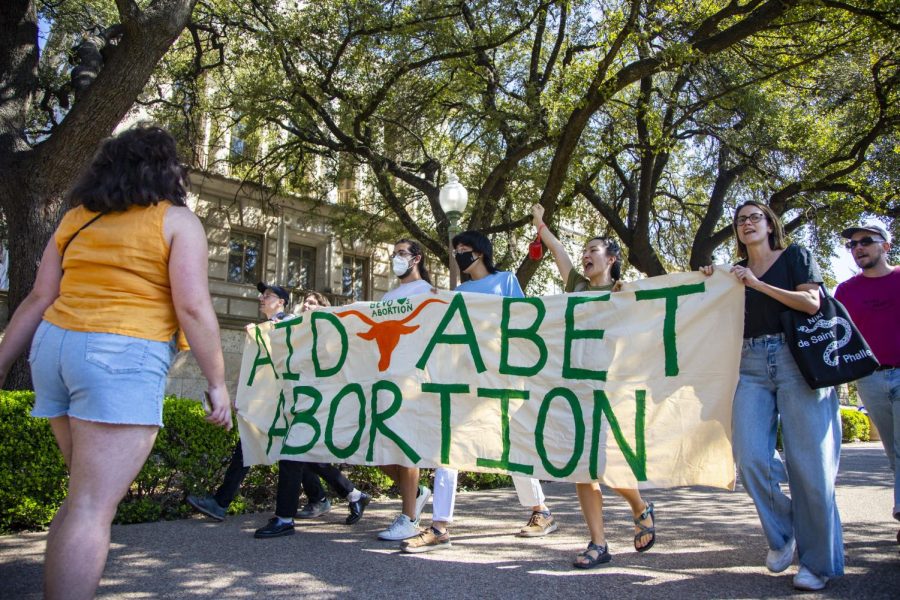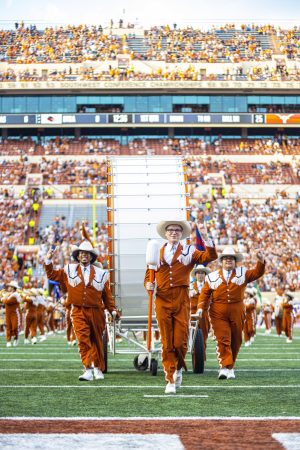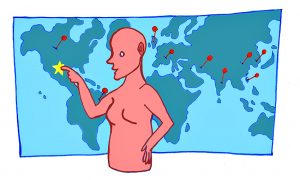Bodily autonomy for all: UT students advocate for reproductive, trans rights following recent state legislature limiting freedom
Protesters hold a banner reading “AID ABET ABORTION” during a protest on the West Mall on Oct. 6, 2022.
October 7, 2022
Students chanted “hey hey, ho ho, abortion bans have got to go,” on the Oct. 6 Day of Action for Bodily Autonomy protest — a national event which included 50 campuses across 30 states.
The Graduate Student Action Network set the day for the event, but two leaders within If/When/How Texas Law, Julia Draper and Zoe Dobkin, spearheaded the event on the UT campus.
“(Reproductive) justice is not just about tearing down legal barriers,” Draper, a second-year law student said to the crowd. “It’s about building more and better ways for us to take care of our own bodies and create the families we want, when we want.”
At the rally, 100 participants advocated for safe, legal and accessible abortions, the right to gender-affirming care, access to free contraception and mandatory sex education in public schools. They also pushed for the rights proposed in a statement last July by the UT Coalition for Reproductive Justice and Rights following the June 24 overturning of Roe v. Wade.
In the statement addressed to the University, the organization called for administrative support of students using their First Amendment right of free speech to advocate for reproductive rights, justice and autonomy. They also called for on-campus access to reproductive education and contraceptive methods.
“To watch our political leaders rejoice over (the abortion ban) while many of us grieve is a harrowing reminder that our lives – as Texans and as Longhorns – are of little to no value to them,” the UT Coalition for Reproductive Justice and Rights said in the statement. “The right to control our bodies and the ability to make healthcare decisions that should be private should not belong to any government or anyone other than ourselves.”
The protesters held a moment of silence for those who suffered from reproductive injustice. They also made a land acknowledgment for Indigenous and Native persons. Various speakers from both UT and national organizations covered reproductive rights and talked about the injustices occurring within the transgender community as local, state and federal governments limit the freedom of gender and sexual expression.
“Amplify the voices of Black Indigenous folks of color, people with disabilities, migrants, trans and gender expansive folks, and trans and queer people,” Gin Pham, the communications and outreach manager for Transgender Education Network of Texas said.
Students held handmade posters including ones that said “if my vagina shot bullets, it would be less regulated” and that “hate isn’t a Texan value.” OUTLaw member Blaine Campbell who attended the event, displayed her sign that said “protect abortion access.”
“I feel that the fight for bodily autonomy is inextricably linked to the issue of abortion rights,” Campbell, first-year law student said.“The issues that trans people and people who can give birth experience are fundamentally linked in a way that needs to be politically recognized in Texas.”
According to If/When/How Texas Law’s press brief, the Supreme Court’s decision in the Dobbs v. Jackson Women’s Health Organization case inspired the event.
In a statement Shilpa Bakre, executive director of University marketing and communications said, “University Health Services offers a variety of reproductive healthcare services for students such as annual wellness exams and education, pregnancy testing, and information on
contraceptives and pregnancy prevention. UHS does not dispense abortive medications, provide abortion services, or obstetrical/prenatal services.”
The University declined to comment on the Oct. 6 event and the sentiments expressed during it.















